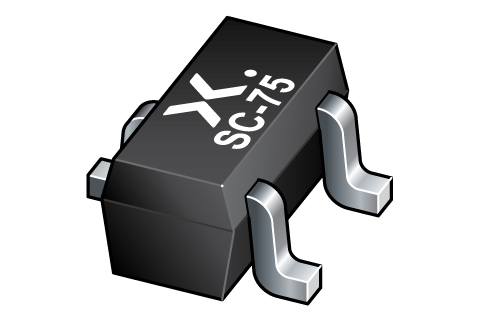
Register once, drag and drop ECAD models into your CAD tool and speed up your design.
Click here for more information2PA1774S
PNP general-purpose transistor
PNP transistor in a SOT416 (SC-75) plastic package. The NPN complement is 2PC4617.
Features and benefits
- Low current (max. 150 mA)
- Low voltage (max. 50 V)
- AEC-Q101 qualified
Applications
- General-purpose switching and amplification in communication, Electronic Data Processing (EDP) and consumer applications.
Parametrics
| Type number | Package version | Package name | Size (mm) |
|---|---|---|---|
| 2PA1774S | SOT416 | SC-75 | 1.6 x 0.75 x 0.9 |
Package
All type numbers in the table below are discontinued.
| Type number | Orderable part number, (Ordering code (12NC)) | Status | Marking | Package | Package information | Reflow-/Wave soldering | Packing |
|---|---|---|---|---|---|---|---|
| 2PA1774S | 2PA1774S,115 (934050970115) |
Obsolete |

SC-75 (SOT416) |
SOT416 | SOT416_115 |
Environmental information
All type numbers in the table below are discontinued.
| Type number | Orderable part number | Chemical content | RoHS | RHF-indicator |
|---|---|---|---|---|
| 2PA1774S | 2PA1774S,115 | 2PA1774S |
|
|
Series
Documentation (6)
| File name | Title | Type | Date |
|---|---|---|---|
| 2PA1774 | PNP general-purpose transistor | Data sheet | 2009-12-07 |
| AN90063 | Questions about package outline drawings | Application note | 2025-03-12 |
| Nexperia_package_poster | Nexperia package poster | Leaflet | 2020-05-15 |
| LSYMTRA | Letter Symbols - Transistors; General | Other type | 1999-05-06 |
| SOT416 | plastic, surface-mounted package; 3 leads; 1 mm pitch; 1.6 mm x 0.75 mm x 0.9 mm body | Package information | 2025-01-31 |
| 2PA1774S | 2PA1774S SPICE model | SPICE model | 2024-08-27 |
Support
If you are in need of design/technical support, let us know and fill in the answer form we'll get back to you shortly.
Longevity
The Nexperia Longevity Program is aimed to provide our customers information from time to time about the expected time that our products can be ordered. The NLP is reviewed and updated regularly by our Executive Management Team. View our longevity program here.
Models
| File name | Title | Type | Date |
|---|---|---|---|
| 2PA1774S | 2PA1774S SPICE model | SPICE model | 2024-08-27 |
How does it work?
The interactive datasheets are based on the Nexperia MOSFET precision electrothermal models. With our interactive datasheets you can simply specify your own conditions interactively. Start by changing the values of the conditions. You can do this by using the sliders in the condition fields. By dragging the sliders you will see how the MOSFET will perform at the new conditions set.